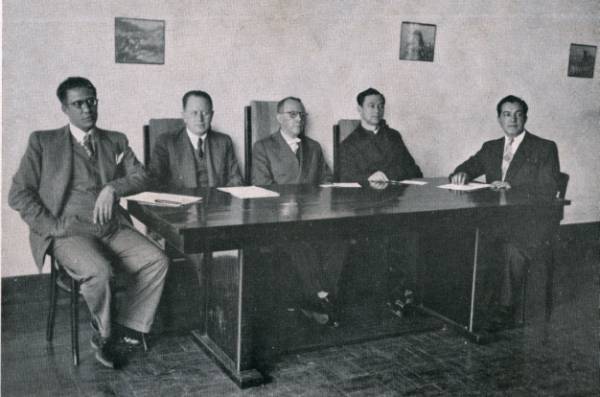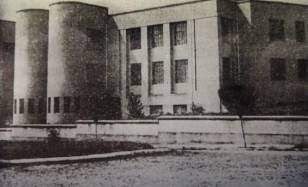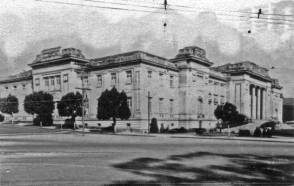THE FOUNDING
The history of the founding of the Faculty of Languages, Literature, and Linguistics at UFMG starts in the late 1930s, even before its first class in 1941. At that time, a group of intellectuals associated with Marconi High School decided to form an institution of higher learning with the objective of training teachers in Belo Horizonte. Before its founding, the available courses of study available in the late 19th century and early 20th century consisted of training for engineers, doctors, dentists, pharmacists, and lawyers. Therefore, a large part of the first professors of the new institution came from the School of Law. Being named the Faculty of Philosophy of Minas Gerais, it was founded on April 21st, 1939.
 |
| Profs. Arthur Versiani Velloso, Braz Pellegrino, Lúcio José dos Santos (Director), Padre Clóvis de Souza e Silva e José Lourenço de Oliveira |
Two years after the initial founding of the Faculty, Professor Lúcio José dos Santos (1875-1944) administered the inaugural lecture, symbolizing the official induction of the Classical Languages, Neo-Latin Languages, Philosophy, Mathematics, Geography, History, and Social Science programs. This lecture was held on March 18th, 1941, at Marconi High School, located in the neighborhood called Santo Agostinho. Classes were held in this location until April 1942. From 1942 to 1952, the aforementioned programs were headquartered in the old Escola Normal Modelo, known today as the Instituto de Educação de Minas Gerais, located in Funcionarios.
 |
 |
| Colégio Marconi (1941) | Instituto de Educação (1942 a 1952) (old Escola Normal Modelo) |
FIRST PROFESSORS
Below, some of the prominent tenured professors who helped design the initial courses and also taught the initial classes:
 |
 |
 |
|
José Lourenço de Oliveira (1904-1984) |
Mário Casassanta (1898-1963) |
Aires da Mata Machado filho (1909-1985) |
 |
 |
 |
|
Guilhermino César (1908-1993) |
Abgar Renault (1901-1995) |
Eduardo Frieiro (1889-1982) Hispanic-American Literature |
 |
 |
 |
|
Cláudio da Silva Brandão (1894-1965) |
Arduíno Bolivar (1873-1952) |
Orlando Magalhães Carvalho (1910-1998) |
 |
 |
 |
|
José Carlos Lisboa (1902-1994) |
Vincenzo Spinelli (1896-1973) |
Orozimbo Nonato da Silva (1891-1991) |
Among these accomplished professors, Professor José Lourenço de Oliveira (1904-1984) brought special recognition to the institution for his significant role in its founding and administration, as well as for his research contributions in the field of linguistics. He was a tenured professor of the Faculty from 1941 to 1969, and achieved the status of Professor Emeritus at UFMG in 1974.
The First Students
In March 1941, seven students successfully passed the entrance exam to enroll and form the first class within the Faculty of Languages, Literature, and Linguistics. Of this group, two studied Classical Languages (João Etienne Arregui Filho and Rubens Costa Romanelli), and five studied Neo-Latin Languages (Cornelia Gomes de Padua, Helio de Almeida Brum, Maria da Conceição Assunção, Marília de Dirceu Amorim e Natália Amorim). In 1943, Ruben Costa Romanelli, Maria da Conceição Assunção, Marília de Dirceu Amorim, and Nátalia Amorim earned their bachelor’s degrees from the Faculty.
Of the first group, it is worth highlighting Rubens Costa Romanelli (1913-1978). After graduating from the Language program, Romanelli returned to this very same institution as a professor. Many years later, he presided the graduate school formation committee, and in 1973, was elected the first Graduate School Coordinator.
 |
 |
| Rubens Costa Romanelli in 1943 (Graduation Portrait) and 1972 | |
The second group entered the faculty in 1942. Two notable students of this class are Wilton Cardoso de Souza (1916-1999) and Maria Luiza Ramos. Shortly after graduation, Wilton Cardoso became an assistant to the tenured professors of both the Portuguese and Brazilian Literature departments. In the 1960s, he became a full professor and held this position until his retirement in 1986. Professor Maria Luiza Ramos also taught at FALE. She later published a remarkable book in the literary theory field, Fenomenologia da obra literária, and continued to lecture until her retirement in 1983.
 |
 |
 |
| Wilton Cardoso de Souza (1970s) | Maria Luiza Ramos (1940s and 2006s) | |
Of the class of 1943, two students rose to prominence in the artistic world. Laís Corrêa de Araújo (1928-2006), considered one of the most prominent female writers of modern Brazilian poetry, and Maria Lúcia Godoy, a world-renowned classical singer.
 |
 |
| Laís Corrêa de Araújo (1950s) | Maria Lúcia Godoy |
The class of 1946 gave us Professor Ângela Toneli Vaz Leão, who from 1959 to 1987, worked as a full professor and researcher, and in 1990, was honored with the title of Professor Emeritus. Additionally, she was the first female Dean of the Faculty of Languages, Literature, and Linguistics (1969-1973).
 |
 |
| Ângela Toneli Vaz Leão( 1940s and 2009) | |
Developments
In 1948, the Faculty of Philosophy, which until then was a private entity, became a public state institution by integrating with the University of Minas Gerais (UMG). A year later, UMG became federalized, becoming UFMG, and the Faculty of Philosophy became the Faculty of Philosophy and Humanities. In 1953, the Language program moved its activities from the Normal School to the Acaiaca Building downtown. In 1961, the Faculty moved to the old FAFICH building, on Carangola street in Santo Atônio, remaining there until 1982.
 |
 |
| Acaiaca Building (1953-1960) | Carangola St. Building (1961-1982) |
In 1968, in accordance with federal law, the Faculty of Philosophy and Humanities dismembered, and became separate academic entities: Institute of Biological Sciences, Institute of Information Sciences, Institute of Geosciences, Faculty of Philosophy and Humanities, Faculty of Education, and the Faculty of Languages, Literature, and Linguistics. On the 26th of November, 1968, the Faculty of Languages, Literature, and Linguistics had its first congregation, and on the 28th of February, 1969, Professor Ângela Vaz Leão was elected the first director of FALE.
In addition to the Neo-Latin and Classical literature departments founded in 1941, the Anglo-Germanic department was founded in 1942. Years later, in the early 1960s, the faculty began to offer specific language tracks: English, French, Italian, Spanish, German, Latin, and Greek. And in the beginning of the 1970s, the Extension Program of FALE was created.
Since the 1950s, doctoral programs were constituted for candidacy of associate professor and tenured-professor positions. By 1973, 33 doctoral dissertations had been successfully defended. In that same year, the Graduate Program was formally institutionalized. For the Master’s in Languages and Literature, six concentration tracks were created: Linguistics, Literary Theory, Portuguese Language, Brazilian Literature, English Language, and French Language(discontinued). The initial faculty members of this new graduate program consisted of: Angela Vaz Leão, Eunice Souza Lima Pontes, José Henrique Santos e Rubens Costa Romanelli (President). The first dissertation defense of the program occurred in 1977, in the field of linguistic studies by Francisco de Filippo, who was advised by Professor Mário Alberto Perini. In the following year, the first literary studies Master’s thesis was defended by graduate student Lauro Belchior Mendes, advised by Professor Letícia Malard.
Present
In 1983, the Faculty of Languages, Literature, and Linguistics moved to its current home on the UFMG Pampulha Campus.
 |
| Faculty of Languages, Literature, and Linguistics (Since 1983) |
When the Faculty of Languages, Literature, and Linguistics was founded, it was organized into four departments: Department of Portuguese (Vernacular Languages), Department of Classical Languages, Department of Romance Languages, and the Department of Germanic Languages. In October, 1978, the Department of Portuguese was dismembered into the Department of Linguistics and Literary Theory. These departments were reorganized further in 1988, when the department of Linguistics and Literary Theory was divided in two, creating the Department of Linguistics and the Department of Semiotics and Literary Theory. Additionally, in 1995, the name of the Germanics Department was changed to the Department of Anglo-Germanic Languages.
On the 7th of November, 2002, with the approval of the University Council of UFMG, the rules of procedure (Resolution 12/2002) that pertained to the departmental structure of FALE were nullified. In March 2003, the new structure of the Faculty of Languages, Literature, and Linguistics was implemented.
In 1994, the Graduate program was divided as well, creating the Graduate Program in Linguistic Studies, and the Graduate Program in Literary Studies. In 2013, the ProfLetras program was created (Professional Language Master's Program). Also in 2013, the number of theses and dissertations produced by the Department reached 2,000.
Since the creation of the undergraduate program in 1941, the number of FALE graduates surpassed an astounding 8,000 mark in 2013.
















